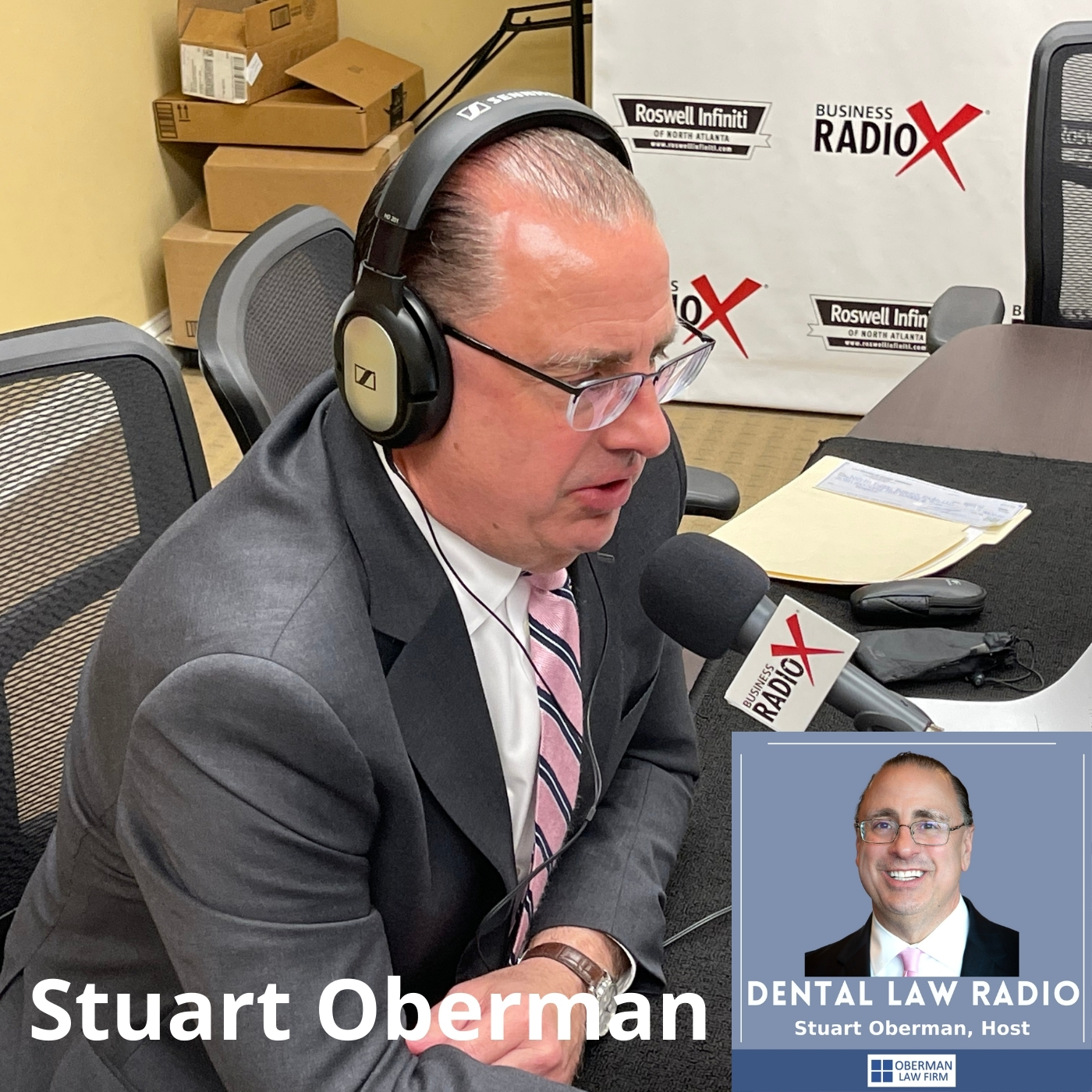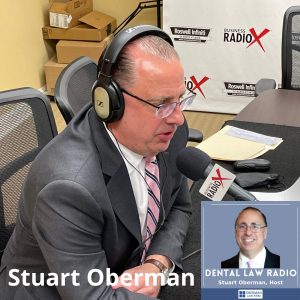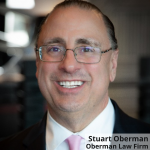

Are You Violating Federal Law in the Interview Process? (Dental Law Radio, Episode 13)
Before you start interviewing for that open position in your practice, you’d be wise to listen to this episode of Dental Law Radio. Host Stuart Oberman offered a reminder that ADA requirements apply in the interview process, not just after an employee is hired. Stuart also covered a growing trend: interviewees secretly recording their interviews with potential employers. Dental Law Radio is underwritten and presented by Oberman Law Firm and produced by the North Fulton studio of Business RadioX®.
TRANSCRIPT
Intro: [00:00:01] Broadcasting from the Business RadioX Studios in Atlanta, it’s time for Dental Law Radio. Dental Law Radio is brought to you by Oberman Law Firm, a leading dental-centric law firm serving dental clients on a local, regional, and national basis. Now, here’s your host, Stuart Oberman.
Stuart Oberman: [00:00:26] Hello everyone, and welcome to the Dental Law podcast. You know, as we go into this second half of the year, if you will, we’re seeing a lot of H.R. Movement in the Federal Law area. And we’re becoming more and more astute as to interviewing process, Americans with Disabilities Act. And we’re getting a lot of questions regarding the interview process. What do we do? How do we do it? What’s the questions? What’s not the questions? What’s the proper answer? Are we doing Zoom calls? What’s the protocols for the interviews now in today’s world?
Stuart Oberman: [00:01:04] So, I want to hit a couple of things that, really, our doctors are do not know about, I would say as a whole. And I think it’s important because it is one less step that doctors have to worry about. So, we’re going to talk a little bit about are you violating Federal Law during the interview process, which is an absolute loaded question.
Stuart Oberman: [00:01:24] So, what we’re discovering now is, actually, interviewees on Zoom calls are actually recording your phone calls or recording your sessions. We’re discovering that potential candidates are also recording your conversations during an interview process. So, what you thought was a confidential communication between a prospective employee and employer is now going viral. So, I think you got to be very, very, very careful how the interview process takes place, the procedures in place, make sure the questions are in place, make sure that you have the protocols in place to have a legitimate interview process, which is not in violation of State and Federal Law.
Stuart Oberman: [00:02:20] But I want to talk about a lawsuit that came about that, I think, has been on the horizon for a while and it’s been a topic of a lot of things that we see in our dental offices also. So, on April 29, 2001, the EEOC filed suit against Wal-Mart. Again, I want to drill this down to how this affects our doctors, an interview process. So, our doctors have to be aware of the American with Disabilities Act whenever they are interviewing anyone or actually working with employees on a day-to-day basis.
Stuart Oberman: [00:02:53] So, what does this lawsuit allege? It alleges something our doctors probably do not do on a daily basis. The allegation, that Wal-Mart violated the Federal Law by not providing a sign language interpreter for the applicant. So, the question is, doctors, staff members, team members, what are you going to do if you discover that an applicant who’s qualified, that’s a good candidate, comes with an ADA requirements – Americans with Disabilities Act requirements – for a legitimate interview, and you have to accommodate that. Do you have a procedure in place to accommodate that worker?
Stuart Oberman: [00:03:47] An interview process, you have to hire them, but do you have a process in place to accommodate them? So, the allegation is, they basically failed to hire this particular person because he was deaf. So, the EEOC, of course, says the ADA requires that employers provide a disabled and able-bodied applicants the same opportunity to compete for the job, which is fair. The question is, when you do your interview process, are you doing that? How are you doing that? What’s the process? Do you even know, when that person comes in, if there’s a disability? And if so, what do you do when you discovered that interview process? Or, do you do what probably a lot of our employers or doctors do, have a ten-minute interview and they’re done? You made the decision even before the person sits down.
Stuart Oberman: [00:04:47] So, the bottom line is, is that, when the H.R. process or an interview process, you have to make sure, one, your questions are legitimate. Two, your reasoning is legitimate. Three, that you’re absolutely complying with all the ADA requirements that are required to provide the applicant the same opportunity as a – I’ll use the term – normal bodied person that is not subject to the American with Disabilities Act.
Stuart Oberman: [00:05:21] So, the bottom line is, is that, as these rates increase, as our exposure increases because potential candidates are now recording conversations, candidates are now putting things viral, interview process-wise, the EEOC is going to hold you accountable. That’s the last thing you need. And you’re trying to hire a candidate and, all of a sudden, you’ve got the EEOC filing a complaint against you because you failed to comply with the ADA.
Stuart Oberman: [00:05:52] So, when you start this process again, H.R., H.R. in dental offices is your biggest nightmare. You got a procedure in place; you’ve got a person appointed in your office to understand this. This is not your sixth person position. You can’t have one person doing H.R. You can’t have one person doing payroll. You can’t have the same person doing hygiene, checking out. It’s not going to work. That’s a recipe for disaster.
Stuart Oberman: [00:06:21] So, again, take a look at your policies, tailor your procedures, what is your H.R. in place? Especially in today’s economy where it is so hard to find workers, workers are as transient as ever in today’s world. Some of our doctors are showing 30, 40, 60, 70 percent turnovers. That is a lot. And you have to have a policy in place, procedures in place, for interviews. It is critical. A bad interview, a bad procedure, a bad H.R. matter will set you back months and years.
Stuart Oberman: [00:06:58] So, quick update, H.R.. Do it, get it in place, keep up to date what’s going on. For those who really want to get involved in H.R. process, I would urge you to reach out to us. We do have a newsletter for our clients. We really try to have a lot of bullet points on H.R. process because it is so ongoing. They’re not comprehensive. It’s not a six day read. A lot of us just touch points what you need to know. Please feel free to give us a call. Please reach out to us. That’s what we do every day so we have a lot of knowledge with any industry.
Stuart Oberman: [00:07:37] Any questions, please feel free to give us a call at 770-886-2400. Feel free to reach out to me directly, stuartoberman – Stuart, S-T-U-AR-T – @obermanlaw.com. Thank you everyone. Hopefully, this has been of some value. If you just took away one particular piece of advice, then it’s a success as far as I’m concerned. Have a great day. And we’ll see you back in our next podcast.
About Dental Law Radio
Hosted by Stuart Oberman, a nationally recognized authority in dental law, Dental Law Radio covers legal, business, and other operating issues and topics of vital concern to dentists and dental practice owners. The show is produced by the North Fulton studio of Business RadioX® and can be found on all the major podcast apps. The complete show archive is here.
Stuart Oberman, Oberman Law Firm
 Stuart Oberman is the founder and President of Oberman Law Firm. Mr. Oberman graduated from Urbana University and received his law degree from John Marshall Law School. Mr. Oberman has been practicing law for over 25 years, and before going into private practice, Mr. Oberman was in-house counsel for a Fortune 500 Company. Mr. Oberman is widely regarded as the go-to attorney in the area of Dental Law, which includes DSO formation, corporate business structures, mergers and acquisitions, regulatory compliance, advertising regulations, HIPAA, Compliance, and employment law regulations that affect dental practices.
Stuart Oberman is the founder and President of Oberman Law Firm. Mr. Oberman graduated from Urbana University and received his law degree from John Marshall Law School. Mr. Oberman has been practicing law for over 25 years, and before going into private practice, Mr. Oberman was in-house counsel for a Fortune 500 Company. Mr. Oberman is widely regarded as the go-to attorney in the area of Dental Law, which includes DSO formation, corporate business structures, mergers and acquisitions, regulatory compliance, advertising regulations, HIPAA, Compliance, and employment law regulations that affect dental practices.
In addition, Mr. Oberman’s expertise in the health care industry includes advising clients in the complex regulatory landscape as it relates to telehealth and telemedicine, including compliance of corporate structures, third-party reimbursement, contract negotiations, technology, health care fraud and abuse law (Anti-Kickback Statute and the State Law), professional liability risk management, federal and state regulations.
As the long-term care industry evolves, Mr. Oberman has the knowledge and experience to guide clients in the long-term care sector with respect to corporate and regulatory matters, assisted living facilities, continuing care retirement communities (CCRCs). In addition, Mr. Oberman’s practice also focuses on health care facility acquisitions and other changes of ownership, as well as related licensure and Medicare/Medicaid certification matters, CCRC registrations, long-term care/skilled nursing facility management, operating agreements, assisted living licensure matters, and health care joint ventures.
In addition to his expertise in the health care industry, Mr. Oberman has a nationwide practice that focuses on all facets of contractual disputes, including corporate governance, fiduciary duty, trade secrets, unfair competition, covenants not to compete, trademark and copyright infringement, fraud, and deceptive trade practices, and other business-related matters. Mr. Oberman also represents clients throughout the United States in a wide range of practice areas, including mergers & acquisitions, partnership agreements, commercial real estate, entity formation, employment law, commercial leasing, intellectual property, and HIPAA/OSHA compliance.
Mr. Oberman is a national lecturer and has published articles in the U.S. and Canada.
Oberman Law Firm
Oberman Law Firm has a long history of civic service, noted national, regional, and local clients, and stands among the Southeast’s eminent and fast-growing full-service law firms. Oberman Law Firm’s areas of practice include Business Planning, Commercial & Technology Transactions, Corporate, Employment & Labor, Estate Planning, Health Care, Intellectual Property, Litigation, Privacy & Data Security, and Real Estate.
By meeting their client’s goals and becoming a trusted partner and advocate for our clients, their attorneys are recognized as legal go-getters who provide value-added service. Their attorneys understand that in a rapidly changing legal market, clients have new expectations, constantly evolving choices, and operate in an environment of heightened reputational and commercial risk.
Oberman Law Firm’s strength is its ability to solve complex legal problems by collaborating across borders and practice areas.
Connect with Oberman Law Firm:
Company website | LinkedIn | Twitter















